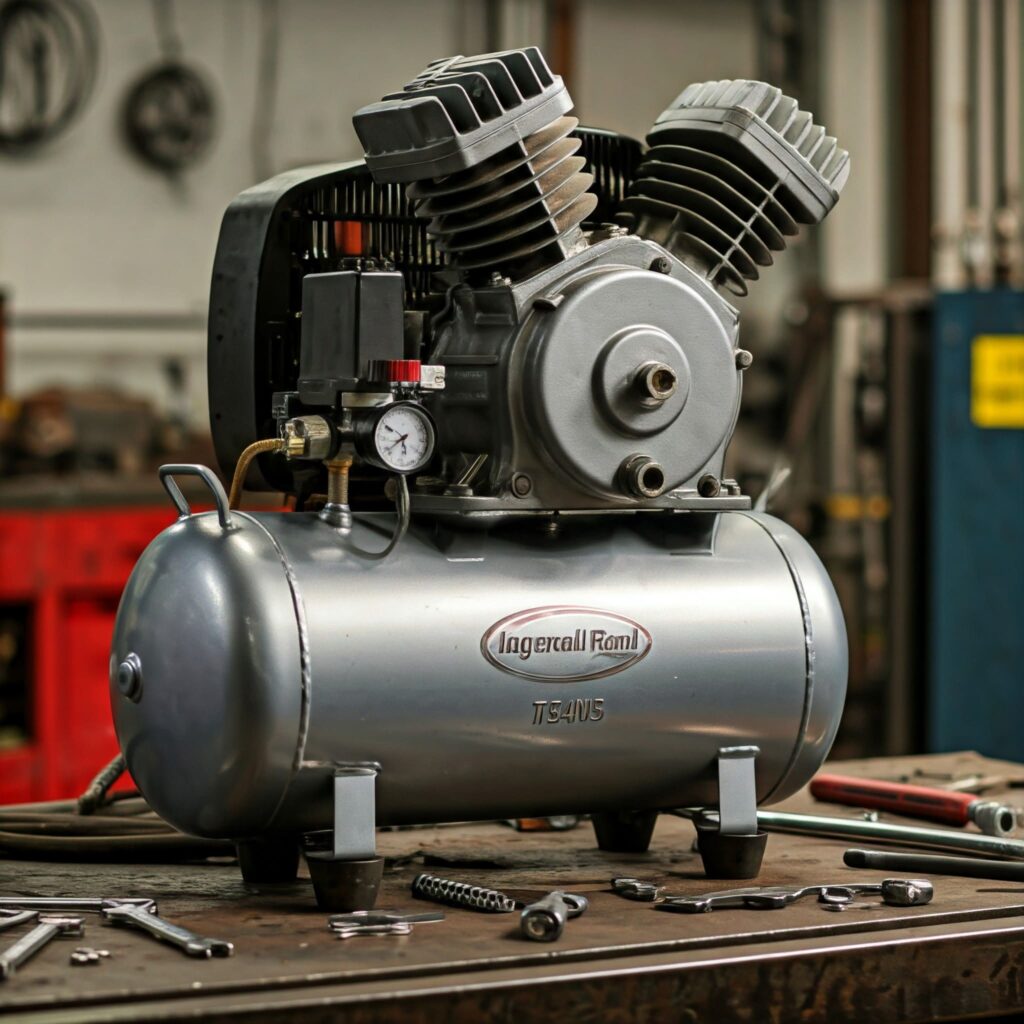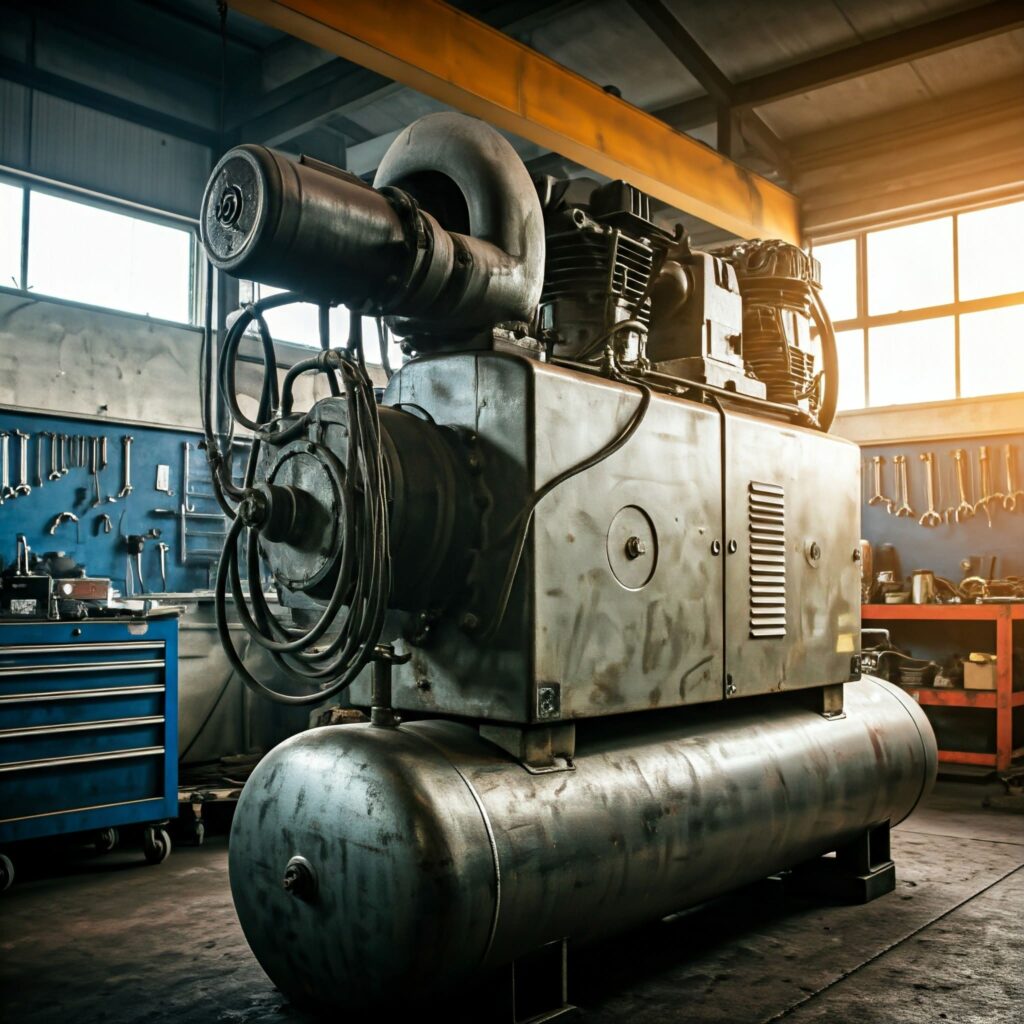Proper lubrication is at the heart of every well-maintained air compressor, whether used in a professional garage or industrial setting. Yet, one persistent question often arises: Can motor oil be used as a substitute for compressor oil?
While it might seem convenient to repurpose motor oil, this decision can lead to performance failures and shorter equipment lifespans. Understanding the critical differences between motor oil and compressor oil is the first step toward making informed maintenance decisions.
This article explains those differences, highlights the advantages of synthetic options, and evaluates reliable solutions from respected brands like Valvoline, Mobil, and AMSOIL.
Motor Oil vs. Compressor Oil: What Sets Them Apart
Motor oil and compressor oil are not interchangeable. Despite their shared role in lubrication, they are designed for completely different applications. Here’s why:
- Additive Compatibility: Unlike compressor oils, motor oils contain detergents and other additives that can cause carbon buildup, reducing compressor efficiency.
- Moisture and Emulsification: Compressors often encounter moisture, and motor oil lacks the water-separation properties needed to prevent harmful emulsions.
- Thermal Resistance: Compressor oils are engineered to withstand intense heat without forming sludge or varnish—something motor oils struggle to achieve.
Each of these factors underscores why using dedicated compressor oils is not just beneficial but essential for maintaining reliable and efficient equipment.
Synthetic Oils vs. Conventional Oils: Performance Unveiled
Not all compressor oils are created equal, and one of the most significant distinctions is between synthetic and conventional formulations. Each offers unique benefits and trade-offs.
Molecular Structure and Consistency
- Conventional Compressor Oils: Derived from crude oil, they contain a range of molecular sizes along with natural impurities. This variability can impact consistency and long-term performance under harsh conditions.
- Synthetic Compressor Oils: Precision-engineered molecular structures ensure uniformity. This enhances performance by providing predictable and reliable properties in high-pressure, high-heat environments.
Advantages of Synthetic Compressor Oils
- Extended Oil Life: Synthetic oils resist oxidation and degradation, resulting in fewer oil changes and reduced downtime.
- Enhanced Lubrication: Superior film strength minimizes friction, protecting against wear in demanding applications.
- Thermal Stability: High resistance to heat prevents sludge and varnish, ensuring smooth operations even at elevated temperatures.
- Improved Water Separation: Synthetic oils actively separate water to prevent harmful emulsions.
While synthetic oils may have a higher upfront cost, their durability and reduced maintenance requirements often translate into significant long-term savings.

Comparing Compressor Lubricants: Valvoline, Mobil, and AMSOIL
Professionals seeking reliable compressor oils often turn to products from leading brands. Below is a balanced look at what Valvoline, Mobil, and AMSOIL have to offer:
Valvoline Compressor Oils
- Key Features:
- Exceptional high-temperature stability and low-foaming properties.
- Advanced oxidation resistance and rust protection.
- Compatibility across various compressor types (rotary, reciprocating) and some hydraulic systems.
- Performance Highlights: Excels in preventing wear and sludge formation, ensuring smooth operation over extended service intervals.
Mobil Compressor Oils
- Key Features:
- Superior anti-wear and corrosion protection.
- Rapid air release and foam control for enhanced efficiency.
- Designed for reliability in industrial compressors.
- Performance Highlights: Reduces maintenance, offers extended oil life, and improves overall system reliability.
AMSOIL Compressor Oils
- Key Features:
- Engineered with high-purity synthetic base oils.
- Long service intervals reaching up to 8,000 operating hours.
- Exceptional water separation, oxidation resistance, and anti-foam properties.
- High flash point for added safety during use.
- Performance Highlights: Enhances compressor efficiency, minimizes downtime, and extends equipment lifespan while providing superior protection against water contamination.
These brands all deliver high-performing solutions tailored to specific operational needs. Users should reference their equipment’s manual for the recommended viscosity grade and oil specifications.
Best Practices for Compressor Maintenance
To ensure long-term performance and reliability, consider the following compressor maintenance tips:
- Follow Manufacturer Guidelines: Always use the recommended oil type and ISO viscosity grade for your equipment.
- Avoid Substitutions: Resist the urge to use motor oil or general-purpose lubricants; these can lead to inefficiencies and wear.
- Monitor and Replace Oil Regularly: Maintain appropriate oil-change intervals to prevent contamination and ensure consistent performance.
- Address Moisture Accumulation: Use oils with strong water separation to prevent damage from emulsification in moisture-prone compressors.
For more detailed insights, visit Air Best Practices for a practical guide on reciprocating air compressor maintenance.

Conclusion
Choosing the correct oil for your air compressor is more than a maintenance decision—it’s an investment in performance and durability. The differences between motor oils and compressor oils highlight why specialized products are essential for efficient operation.
Synthetic compressor oils, with their uniform molecular structures, extended oil life, and superior thermal resistance, offer distinct advantages over conventional formulas. Among leading brands, Valvoline, Mobil, and AMSOIL each provide high-performing solutions tailored to professional and industrial requirements.
By adhering to best practices and choosing the right lubricant, professionals can maximize compressor efficiency, reduce maintenance costs, and ensure their equipment lasts for years to come.
FAQ
Q: Can synthetic motor oil be used in place of compressor oil?
No, motor oil does not provide the specific properties required for compressors, such as water separation and anti-carbon buildup capabilities.
Q: What viscosity grade should I choose for my air compressor?
Check your compressor’s manual for the manufacturer’s recommended ISO viscosity grade.
Q: Is synthetic compressor oil worth the higher cost?
Yes, the extended drain intervals, reduced wear, and overall enhanced performance justify the investment, especially in demanding applications.
Additional Resources
Learn more about Mobil’s compressor oil solutions for industrial applications here, explore Valvoline’s mineral-based compressor oils designed for a range of compressors here, and discover AMSOIL’s line of high-quality compressor oils here.
